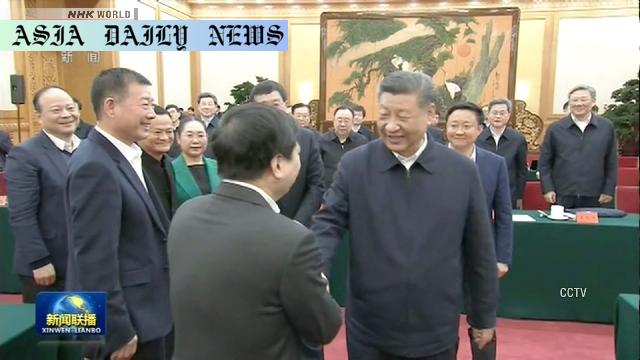Trade Tensions: Xi Jinping underscores private sector’s role in navigating escalating trade challenges with the US.

Introduction: Escalating Trade Tensions
China finds itself at a critical juncture as escalating trade tensions with the United States and a slowing economy loom large. President Xi Jinping recently convened a meeting with key private-sector business leaders in a bid to bolster confidence and chart a way forward amidst these complex challenges. The meeting featured prominent figures such as Jack Ma, founder of Alibaba, and heads from major firms including Huawei and BYD. Discussions centered around restoring momentum to the private sector, which plays a vital role in China’s economic growth and modernization efforts.
President Xi Jinping’s Vision for Private Sector Growth
At the core of the meeting, Xi Jinping emphasized the strategic role of private enterprises in advancing Chinese-style modernization. He called on private entrepreneurs to align their ambitions with national development goals and contribute actively to the country’s economic revival. This declaration signals a renewed focus on leveraging the agility and innovation of the private sector to offset economic headwinds.
Jack Ma’s Resurgence: A New Chapter for Private Enterprise?
One of the most notable features of the meeting was the presence of Jack Ma, who has remained largely out of the public eye since his critical remarks on China’s regulatory environment in recent years. His attendance may reflect a shift toward reconciling lingering tensions between regulatory authorities and private business leaders. This cooperative gesture could mark the start of a more harmonious partnership between China’s government and its private sector, a critical factor for economic rejuvenation.
Economic Slowdown: A Cause for Concern
While the meeting underscored optimism about the future, the challenges facing China cannot be overlooked. The country experienced a 90% drop in foreign direct investment last year, showcasing waning global confidence in its market. Moreover, the ongoing trade skirmish with the United States, fueled by new tariffs and policy realignments under President Donald Trump, has limited growth opportunities for Chinese firms abroad.
The Role of Generative AI and Innovation
Liang Wenfeng, founder of DeepSeek, also attended the meeting to represent the technological frontier of private enterprises. His firm, renowned for its cutting-edge generative AI models, symbolizes the future of China’s ambition to dominate emerging fields. The government’s commitment to innovative sectors like AI and renewable energy is crucial to creating new growth engines that can offset losses in traditional manufacturing and trade.
Navigating the Trade War
Trade frictions between the US and China show no signs of abating. Both countries have imposed tariffs that hurt not just national economies but global supply chains. China’s response to this new normal will be critical. Strengthening its internal market, boosting private sector confidence, and innovating in high-tech industries may serve as viable pathways forward amid this tumultuous period.
The Path Forward for China’s Economy
The significance of Xi Jinping’s recent meeting cannot be overstated. As foreign investments decline and the economy faces slower growth, fostering resilience within the private sector becomes imperative. By emphasizing collaboration with influential business leaders, the Chinese government is signaling its intent to prioritize domestic reforms and provide an enabling environment for private enterprises.
However, addressing international trade challenges will require nuanced diplomacy, strategic innovation, and sustained efforts toward economic liberalization. Whether these efforts will be sufficient to stabilize China’s economic landscape in the face of growing trade tensions, only time will tell.
Commentary
Reflections on Trade Tensions
Trade tensions between two of the world’s largest economies, China and the United States, undeniably hold global ramifications. President Xi Jinping’s outreach to private sector business leaders signals a proactive approach, albeit within a climate fraught with uncertainty. It is commendable that the Chinese government is reiterating the importance of collaboration and innovation, as these elements will be essential for long-term stability.
The Resurgence of China’s Private Sector
Jack Ma’s high-profile reappearance during this meeting is a noteworthy signal to the global community. It reflects an apparent easing stance by Chinese regulatory authorities, which could foster improved relations between the government and private businesses. Such reconciliation is not just beneficial but essential amid the growing challenges posed by slowing economic dynamics.
The Global Implications
The broader implications of this story extend beyond China’s borders. In an interconnected global economy, the trade war between the US and China could usher in cascading effects felt worldwide. From supply chain disruptions to soaring tariffs, the ripple effects are a reminder of the fragile balance underpinning modern economies.
Ultimately, the outcomes of these engagements will hinge upon the adaptability of both government policies and private enterprises. China’s focus on sectors like AI and renewable energy reflects the future-oriented mindset needed during such critical times. It is a cautious yet hopeful blueprint for navigating the economic headwinds of the present and shaping a more stable tomorrow.


